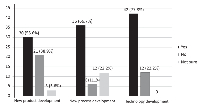Optimizing technologies for pharmaceutical manufacturing in Nigeria post covid-19
Main Article Content
Abstract
Background: The covid-19 pandemic has catalyzed numerous changes accelerating digital health transformation. Industry 4.0 is a concept that represents the adoption of techniques and processes allowed by industrial digitization.
Objective: This study evaluated the impact of covid-19 on Pharmaceutical Industries in Nigeria. It also assesses the awareness and adoption of emerging technologies by Pharmaceutical industries in Nigeria post-covid-19.
Methods: This descriptive cross-sectional study was conducted among Pharmaceutical manufacturing Industries in Nigeria using structured electronic questionnaires for data collection using Google Form software. Data obtained were examined and analyzed by SPSS version 22. Analysis was done using descriptive statistics and results were presented in tables and figures. Chi-square analysis was used to determine the association between variables.
Results: The results show that covid-19 impacted the Nigerian Pharmaceutical Industry in some areas, especially in sourcing and distributing materials. Only 50% indicated any knowledge of 4.0. Their knowledge was related to the size of the companies (p = 0.001). Internet of Things (IoT) and mobile technologies are the most used and were also believed to be the most relevant while Radio Frequency Identification (RFID) and advanced robotics are the least used. The adopted technologies by companies were not associated with the size of the companies (p > 0.05). Lack of experts for training and lack of finance were identified as barriers to technology optimization.
Conclusion: This research provides relevant information concerning the state of awareness, adoption, or preparedness for the adoption of digital technologies among Nigerian Pharmaceutical manufacturers. A lot needs to be done to enable the adoption of Industry 4.0.
Downloads
Article Details
Issue
Section

This work is licensed under a Creative Commons Attribution-NonCommercial-NoDerivatives 4.0 International License.
How to Cite
Share
References
Nwoke EA., Ofomata CJ., Amadi CM., Jibuaku CH., Akahome ID., Nwagbo EC. (2020). Impact of the covid-19 Pandemic on Consumers' Access to
Essential Medicines in Nigeria, The American Society of Tropical Medicine and Hygiene 103(4):1630-1634.
PMGMAN, 2020. Available at https://pmgman.com.Accessed December 3, 2020.
UNIDO (2011), Industrial Development Report 2011. Available at https://www.unido.org/sites/default/files/2012-01/UNIDO_FULL_REPORT_EBOOK_0.pdf. Assessed May 10, 2021.
Market Access Map, International Trade Centre. Available at www.macmap.org. Assessed April 15, 2021.
Schwab K. (2017), The Fourth Industrial Revolution: what it means, how to respond, World Economic Forum, Available at https://www.weforum.org/agenda/2016/01/thefourth-industrial-revolution-what-it-means-andhow-to-respond/. Assessed November 5, 2020.
Kinsley U, Thokozani JK, Pieter H, Valantine TL and Tien CJ (2023). The role of renewable energy sources and Industry 4.0 focus on Africa: A review. Appl. Sci.13(2): 1074. https://doi.org/10.3390/app13021074
China Life Sciences & Health Care Team (2020). covid-19: Pharma Industry Survey Results, Deloitte. Available at www.deloitte.com. Accessed April 21, 2021.
WHO Prequalification Building quality-assured manufacturing capacity in Nigeria (2014), WHO Drug Information, 28(4). Avai lable at:
https://apps.who.int/iris/handle/10665/331090.Assessed July 28, 2021.
Sony M. (2020). Pros and cons of implementing Industry 4.0 for the organizations: a review and synthesis of evidence. Production & Manufacturing Research 8(1):244-272.
Zhong RY., Xua X., Klotz E., Newman ST. (2017). Intelligent Manufacturing in the Context of Industry 4.0: A Review. Engineering 3:616-630.
Markarian J. (2016). "The Internet of Things for Pharmaceutical Manufacturing," Pharmaceutical Technology 40 (9): 54-58.
Obijole E. (2020). Nigeria's Readiness for and the Effect of the Fourth Industrial Revolution, The Fourth Industrial Revolution: Economic Impact and Possible Disruptions. Available at: https://www.exploringeconomics.org/en/discover/nigeria-fourthindustrial-revolution/. Assessed April 15, 2021.
Olamade OO., Oyebisi TO., Egbetokun AA.,Manufacturing Business Environment In Nigeria: Strategic Characteristics And Implications, Advances in Management & Applied Economics 3(6):53-65
Reinhardt IC., Oliveira JC., Ring DT. (2020). Current Perspectives on the Development of Industry 4.0 in the Pharmaceutical Sector. Journal of Industrial Information Integration. Available at:www.elsevier.com/locate/eng. Accessed May 2, 2021.
Siyanbola WO., Oladipo OG., Oyewale AA., Famurewa AJ., Ogundari IO. (2012). AcademiaIndustry Interactions in Nigeria Pharmaceutical
Innovation System, Social and Behavioral Sciences 52:279 - 289.
Devansh S, Prachi P and Manan S. (2023). A comprehensive study on Industry 4.0 in the Pharmaceutical Industry for sustainable
development. Environmental Science and Pollution Research. https://doi.org/10.1007/s11356-023-26856-y
Keng S, Yingrui X and Cui Z. (2019). Industry 4.0: Challenges and Opportunities in Different Countries. Cutter Business Technology Journal 32(6): 1-14
Elnadi M., Abdallah, YO. (2023). Industry 4.0: critical investigations and synthesis of key findings. Manag Rev Q. http://doi.org/10.1007/s11301-022-00314-4
Frank, AG., Dalenogare, LS., Ayala, NF. (2019). Industry 4.0 technologies: implementation patterns in manufacturing companies, International Journal of Production Economics, 210:15-26
Zervoudi EK. (2020). Fourth Industrial Revolution: Opportunities, Challenges, and Proposed Policies. Available at:
https://www.intechopen.com/chapters/70877. Assessed May 19, 2021.


